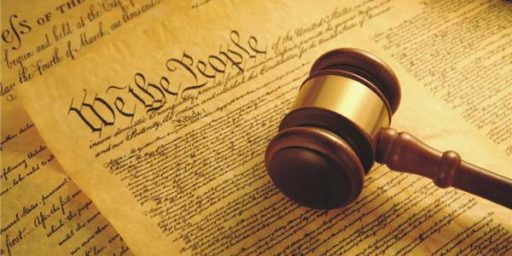Federal Budget Deficit Passes $1 Trillion For Fourth Straight Year
The Federal Budget deficit topped $1 trillion for the fourth consecutive year during the just concluded Fiscal Year 2012:
The federal government logged a $1.1 trillion deficit in fiscal year 2012 — marking the fourth straight year of trillion-dollar shortfalls.
As a share of the economy, the deficit fell to roughly 7%, according to Congressional Budget Office estimates released Friday. That’s down from 8.7% in 2011, and well below the bruising 10.1% recorded in 2009 during the depth of the economic downturn.
Deficits as a share of GDP in the past four years have been the highest since 1947.
The decline is thanks largely to an uptick in revenue. Compared to last year, the federal government collected 6% more in fiscal 2012, which ended Sept. 30
A big reason was the jump in corporate tax receipts, which rose a whopping 34%. CBO attributes the increase in large part to a change in tax rules, particularly those that govern how fast companies can write off equipment costs.
Individual income tax and payroll tax receipts were also higher, by 3% and 4%, respectively.
Spending, meanwhile, fell 2%. That decline, however, is due mostly to shifts in the timing of payments, CBO said.
Outlays for Medicaid, unemployment benefits, defense and education programs all fell. Meanwhile, Social Security outlays rose 6% — more than in recent years. Money spent on Medicare increased more slowly than in the preview two years, rising 3%.
By all accounts, we’re likely to see another trillion dollar deficit during Fiscal Year 2013, or at least get very close to it. At some point, we’re going to pay a price for this.





Maybe. But with interest rates as low as they are now, today is not that day.
By all accounts, this much borrowing should be putting upward pressure on interest rates. Of course, having the credit rating of the country should have put upward pressure on interest rates as well, but the exact opposite happened.
A S-B style plan that combines short-term stimulus and investment with medium and long-term deficit reductions has been a necessary fix for a long time. The one thing I worry about is that things go from sunny to stormy very quickly. It is important to pay attention to the deficit, particularly the structural deficit. But moving too aggressively could threaten the economy and make the problems a lot worse.
@Curtis:
The entire loanable funds framework upon which the mainstream economics profession relies is a myth. The last four years have pretty much confirmed the post-Keyensian Endogenous Theory of Money.
@Curtis:
Yes, by all means let’s wait until interest rates spiral out of control. That makes sense.
@Doug Mataconis: Fortunately interest rates are set by the
Fed, not markets. Interest rates never spiral out of control.
I had a dream last night. A very naive and ridiculous dream that there was something called The American Party, a political party that had gained equal footing with the Republican and Democratic Party. Without accepting campaign donations it became a phenomenon of volunteer created membership and organizational operation. Web Designers, Small Businesses owners, Bloggers, whatever, they all threw whatever they could in helping it exist. I know, ridiculous to be all volunteer. It was a dream. Anyway, it valued constructive collaboration and a common good perspective over specified idealogical policy.
@Ben Wolf:
Do you forget the 1970s?
@Doug Mataconis: Inflation increased sharply in the 70’s due to exogenous supply shocks. Interest rate increases were Paul Volcker’s plan to combat them. The Fed repeatedly jacked up interest rates to choke the life out of the economy in an effort to reduce inflation.
The Fed always calls the shots on interest rates and bond yields.
perhaps a little snarky, but allow me to offer a point of order.
to be over budget means that 1 must first have a budget don’t you think?
Another case where a continuation of trend is not real news. It was more interesting that Mitt was not concerned by this at the debate. Keeping tax the same and firing Big Bird sure ain’t going to do it.
Hell, this is nothing. Social Security and Medicare are off-budget items. With the Boomers retiring and filing for benefits as we speak, and with Gen. Y so uneducated, so largely unemployable, and perhaps nearly fully catatonic, things are about to get much, much worse.
Speaking of the 1970’s, I’m not sure if this got reported nationally (maybe Drudge had it, but I don’t read Drudge), but earlier this week Southern California ran out of fuel. No, seriously, literally, they actually ran out of fuel. Prices spiked overnight some ginormous amount. Scores if not hundreds of retail gas stations had to shut themselves down.
Getting back on topic, the amazing irony is that as horrific as the budget deficit is it’s not even the worst fiscal problem we face. We’ve crossed the Rubicon of a debt-to-GDP ratio > than 100%. That won’t end well. In due course the catastrophic inflation and interest rates of the 1970’s might by comparison look quite tame. If the U.S. were a stock I’d be short selling it.
@Tsar Nicholas:
One of the interesting things is that while our total public debt is above 100%, our federal debt is down around 75%. Much of the difference is in municipal bonds which can default separately. Indeed, they are.
Not an ideal situation, but a little bit of a “crumple zone” on the larger problem.
@Tsar Nicholas:
BTW, you keep saying that. There are all kinds of ways you can short it if you really want to.
Buy credit default swaps on US treasuries!
Oh no, if we aren’t too careful, China is going to repossess us… or something.
@Doug Mataconis:
Why would interest rates go up if the deficit is shrinking as a percentage of GDP?
Sometimes deficit hawking seems more parts superstition than science.
@Console: Some people seem unaware the Federal Reserve is required by its charter to set interest rates, and does so on a daily basis.
So Obama inherited a $1T deficit…and that deficit has remained essentially unchanged for four years. Where’s all the spending Obama has done???
So the story is the Republicans left a mess…and Obama hasn’t cleaned it up fast enough…so we should give the Republicans another shot at it.
Makes perfect sense.
If you’re stupid.
@Ben Wolf:
More or less. If you are running deficits interest rates are defined by the interest rates that people that borrow you money are willing to accept. Inflation also sets interest rates. But, according to you, taxation should be set to zero, government spending should go all up and the Fed should simply print money to pay the bills.
@Andre Kenji:
And now you’ve reduced yourself to lying.
@Andre Kenji:
Really? Government has “borrowed” (according to you) over $6 trillion from savers over the last four years without an interest rate reaction. And inflation most certainly does not control interest rates, because they haven’t reacted to that either. The law states the Fed sets interest rates in the U.S. What part of that is so difficult for your brain to process?
You have no explanation for why your model is failing to account for empirical observations. My model explains those observations and allows us to make accurate forecasts. Which means your model is effectively junk.
@Ben Wolf:
No, that´s the logical conclusion of your thinking.
With two silly wars off-books, the deficit has been out of control for many years. It only matters to “conservatives” when we are spending that money at home.
Neither the D’s nor the R’s are anti-deficit.
@Ben Wolf:
?
No, inflation does not “control” interest rates. But higher inflation means that the Fed has to raise interest rates. There is no inflation now, but a future scenario where there is high inflation is not impossible. In fact, that´s something plausible if unemployment goes down and/or China and other countries trying to manipulate their currency drops down their “treasuries”.
@Andre Kenji:
No, what you wrote above is the conclusion of someone engaged in shallow thinking. Actually I don’t think you’ve given it any thought at all. You’ve certainly never asked a single question.
Inflation does not force the central bank to raise rates.
Employment does not cause inflation. Nor does Chinese manipulation of the yuan cause inflation in the United States.
Weak stuff, man.
@Ben Wolf:
No, because most people know that discussing economics with you is like talking about Evolution with an Evangelical. But it´s always easier to use ad hominem..Specially because you forget that servicing the debt is already the biggest expense of the Federal Government, only behind Defense, Medicare/Medicaid and Social Security.
Only if the Central Bank wants the inflation to go up and up.
I did not say that. I pointed out that you can print a lot of money and face no inflation if unemployment is high. No one knows what can happen in the future, but a future scenario with a Public Debt of more than 200% of the GDP, high unemployment and slow growth is not good. The risk of inflation or stagflation is not good either.